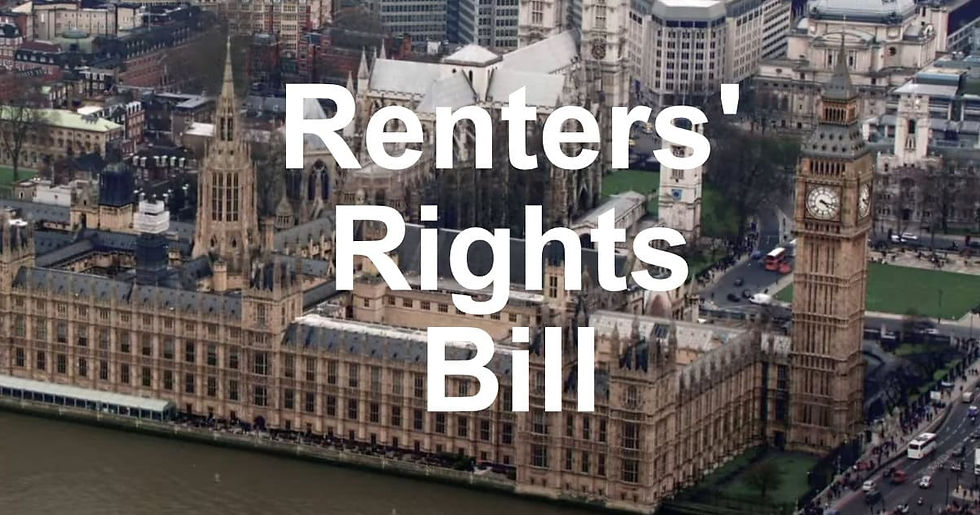📢 What UK Landlords Need to Know: Renters Reform Bill + Property Wealth Tax Updates
- George Samoila

- Sep 17, 2025
- 3 min read

With the political landscape shifting and new legislation being drafted, UK landlords are facing a wave of upcoming changes. In this post, we break down key updates on:
📜 The Renters Reform Bill
💰 Proposed Property Wealth Taxes
💸 Possible National Insurance on rental income
Whether you’re a seasoned investor or just starting out, these updates could reshape how you manage, buy, and profit from your properties.
🏛️ Property Wealth Taxes: What’s on the Table?
Despite promises to protect “working people” by not raising PAYE, VAT, or employee National Insurance, the current government is looking for new sources of tax revenue — and property ownership is firmly in the spotlight.
Two forms of property-related taxes already exist:
1.
Council Tax
Often overlooked, council tax is effectively a property wealth tax. The issue? It’s based on 1991 property valuations — meaning wealthy areas often pay proportionally less than lower-income regions.
Reform is being considered, particularly:
Revaluing properties to reflect modern prices
Charging a 0.5% wealth tax on homes in Bands G & H
Allowing deferral until sale, with a 0.6% charge
2.
Annual Tax on Enveloped Dwellings (ATED)
Rarely encountered by smaller landlords, this tax affects:
Properties worth over £500k
Owned by companies
Used for personal residence (not as a rental business)
💸 Could You Be Paying NI on Rental Income?
A bigger concern for small landlords is the potential addition of National Insurance contributions on rental income.
What we know:
It’s likely to hit individual landlords, not limited companies
It may be charged on gross revenue rather than profit — just like Section 24 changes
It’s being seen as a “soft target” because it doesn’t stifle entrepreneurship or cause people to move abroad
👉 Why it matters:
The vast majority of UK landlords own just 1–2 properties. An NI charge on gross rent could significantly reduce their margins.
🧾 Council Tax Overhaul – The North Pays More
The current system:
Based on 1991 valuations
Often regressive — lower-value homes pay more relative to their value
Unfairly penalises landlords and homeowners in the North
The proposed fix:
Revalue all properties
Band G–H owners pay a property wealth tax to the central government
Excess revenue beyond the current council tax goes to Westminster
But the big issue is liquidity — pensioners or long-time homeowners may struggle to pay an annual 0.5% tax without selling or downsizing.
📜 Renters Reform Bill: Key Takeaways
The bill (still not yet passed, but heading for approval) includes:
✅ End of Section 21
No more “no-fault” evictions. Landlords must cite a reason (e.g. selling, arrears, breaches).
✅ Section 13 Rent Increases Now Challengeable
Tenants can challenge rent increases with the tribunal. If they do:
The increase is paused
It isn’t backdated
It could be 6+ months before a decision is made
✅ Ban on Rental Bidding
Tenants can’t offer more than the asking rent. Expect lottery-like demand in high-rent areas.
✅ Tenants Can Serve Notice via Text
Notice periods from tenants will become more flexible — and easier to serve.
✅ Personal Guarantors Become Crucial
With more rights for tenants, guarantors are becoming the landlord’s best safety net.
✅ No More Mandatory Pet Insurance
Landlords can’t demand it — even if pets are allowed.
✅ Mandatory Landlord Database
All landlords (individual or corporate) will need to register, likely with details and certificates like gas safety and EICRs.
🚨 Ahab’s Law: Addressing Mould
Spurred by the tragic death of Awaab Ishak, this proposed law will:
Require landlords to investigate hazard complaints (especially mould) within 10 days
Apply across the PRS and social housing
Come into effect by 2027
🧠 What Landlords Should Do Now
Here are a few steps to get ahead of the curve:
✅ Review your ownership structure
If you’re still operating in your personal name, consider switching to a limited company setup — especially if NI on rental income becomes law.
✅ Document rent increases carefully
Make sure your Section 13 notices are clear, justified, and well-documented to avoid disputes.
✅ Think long-term
With income tax, inheritance tax, and pension relief also under scrutiny, start thinking about long-term exit planning, reinvestment, and income diversification.
✅ Register early if the landlord database becomes live
It may also present new marketing opportunities.
📅 When Will This All Happen?
Expected passage: Late 2024 or early 2025
Activation: April 2026 (based on current projections)
Budget announcements expected November 2024
🧭 Final Thoughts
The next 12–24 months could fundamentally reshape how landlords operate. But with change comes opportunity.
At Manchester Sourcing, we’re already helping clients:
Navigate legislation changes
Review their tax position
Adjust strategies for long-term cash flow and compliance
📩 Want help reviewing your portfolio or buying strategy? Let’s chat.
Let me know if you’d like a short version to share on social media with a blog link.




Comments